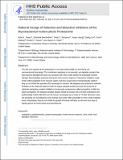| dc.contributor.author | Totaro, Kyle A. | |
| dc.contributor.author | Barthelme, Dominik | |
| dc.contributor.author | Simpson, Peter T. | |
| dc.contributor.author | Jiang, Xiuju | |
| dc.contributor.author | Lin, Gang | |
| dc.contributor.author | Nathan, Carl F. | |
| dc.contributor.author | Sauer, Robert T. | |
| dc.contributor.author | Sello, Jason K. | |
| dc.date.accessioned | 2018-07-09T14:26:32Z | |
| dc.date.available | 2018-07-09T14:26:32Z | |
| dc.date.issued | 2017-02 | |
| dc.date.submitted | 2016-09 | |
| dc.identifier.issn | 2373-8227 | |
| dc.identifier.issn | 2373-8227 | |
| dc.identifier.uri | http://hdl.handle.net/1721.1/116852 | |
| dc.description.abstract | The 20S core particle of the proteasome in Mycobacterium tuberculosis (Mtb) is a promising, yet unconventional, drug target. This multimeric peptidase is not essential, yet degrades proteins that have become damaged and toxic via reactions with nitric oxide (and/or the associated reactive nitrogen intermediates) produced during the host immune response. Proteasome inhibitors could render Mtb susceptible to the immune system, but they would only be therapeutically viable if they do not inhibit the essential 20S counterpart in humans. Selective inhibitors of the Mtb 20S were designed and synthesized on the bases of both its unique substrate preferences and the structures of substrate-mimicking covalent inhibitors of eukaryotic proteasomes called syringolins. Unlike the parent syringolins, the designed analogues weakly inhibit the human 20S (Hs 20S) proteasome and preferentially inhibit Mtb 20S over the human counterpart by as much as 74-fold. Moreover, they can penetrate the mycobacterial cell envelope and render Mtb susceptible to nitric oxide-mediated stress. Importantly, they do not inhibit the growth of human cell lines in vitro and thus may be starting points for tuberculosis drug development. | en_US |
| dc.description.sponsorship | National Institutes of Health (U.S.) (Grant AI-16892) | en_US |
| dc.publisher | American Chemical Society (ACS) | en_US |
| dc.relation.isversionof | http://dx.doi.org/10.1021/ACSINFECDIS.6B00172 | en_US |
| dc.rights | Article is made available in accordance with the publisher's policy and may be subject to US copyright law. Please refer to the publisher's site for terms of use. | en_US |
| dc.source | PMC | en_US |
| dc.title | Rational Design of Selective and Bioactive Inhibitors of the Mycobacterium Tuberculosis Proteasome | en_US |
| dc.type | Article | en_US |
| dc.identifier.citation | Totaro, Kyle A. et al. “Rational Design of Selective and Bioactive Inhibitors of the Mycobacterium Tuberculosis Proteasome.” ACS Infectious Diseases 3, 2 (December 2016): 176–181 © 2016 American Chemical Society | en_US |
| dc.contributor.department | Massachusetts Institute of Technology. Department of Biology | en_US |
| dc.contributor.mitauthor | Barthelme, Dominik | |
| dc.contributor.mitauthor | Sauer, Robert T. | |
| dc.relation.journal | ACS Infectious Diseases | en_US |
| dc.eprint.version | Author's final manuscript | en_US |
| dc.type.uri | http://purl.org/eprint/type/JournalArticle | en_US |
| eprint.status | http://purl.org/eprint/status/PeerReviewed | en_US |
| dc.date.updated | 2018-07-09T13:04:42Z | |
| dspace.orderedauthors | Totaro, Kyle A.; Barthelme, Dominik; Simpson, Peter T.; Jiang, Xiuju; Lin, Gang; Nathan, Carl F.; Sauer, Robert T.; Sello, Jason K. | en_US |
| dspace.embargo.terms | N | en_US |
| dc.identifier.orcid | https://orcid.org/0000-0002-1719-5399 | |
| dspace.mitauthor.error | true | |
| mit.license | PUBLISHER_POLICY | en_US |

